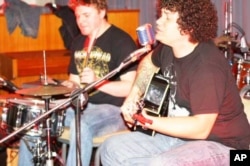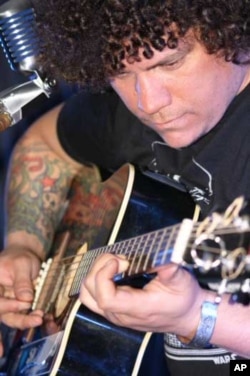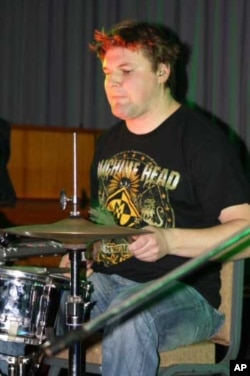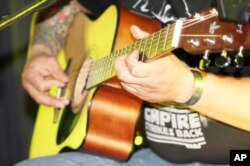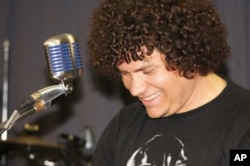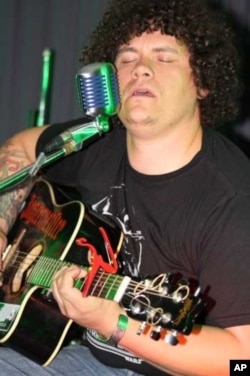This is Part 4 of a 5-part series: New Sounds of Africa
Continue to Parts: 1 / 2 / 3 / 4 / 5
“It’s like a 120 kilogram (265 pound) rugby player taking his jersey and boots off and putting on a frilly little dress and silk slippers and telling his mother, ‘Hey, ma, I want to be a ballerina.’”
This was Johannesburg-based drummer Charles Dubber’s reaction when asked to describe the latest musical project he’s involved in with singer, songwriter and guitarist Westley Engelbrecht.
Dubber’s descriptive answer refers to the astounding metamorphosis the South African duo’s music has recently undergone. Just a few months ago, they were leading proponents of the most extreme of musical genres – death metal. This form of music comes in a leaden package overflowing with ear-splitting blasts of heavily distorted electric guitar, monotonous drum beats, deep vocals growled from the grave and disturbing, near-Satanic lyrics.
“In the words of my songs, I used to embrace death. I dared it, I courted it in my lyrics. Now I write songs that affirm life,” Engelbrecht told VOA. He explained, “Death metal is music from the pit of hell, whereas – at least for me – Spanish flamenco guitar, in its subtlety, its gentleness, comes from the clouds above heaven.”
Dubber said, “The music we’re now making is acoustic liquid.”
‘Sunlight feels good…’
What the two young musicians have done is incomparable – certainly in Africa. They’ve abandoned the “comfort,” as Engelbrecht described it, of massive drum kits, brash electric axes and painful howls, to blend Spanish flamenco guitar with tribal drumbeats and mellifluous, whispered vocals.
“We wanted to challenge ourselves, to see if we could produce quality acoustic music instead of the hard stuff. There’s nothing worse for an artist than to be stuck in a rut, producing the same kind of music over and over again. We wanted to push the boundaries of our capabilities,” said Engelbrecht.
“Personally, I was tired of hiding behind a wall of noise, now we’re out in the open,” said Dubber. Engelbrecht interjected, “The sunlight feels good…”
Dubber started playing drums at the age of 17. “I’ve been playing for 12 years now. The more and more I play, the more and more I get sucked in. It’s just such a challenge the whole time and it’s a constant learning curve, which I really enjoy,” he said.
Engelbrecht arrived at the guitar through the piano, which he learned as a boy.
“I started composing music at a very young age, and it’s been my passion ever since. I’m able to express my emotions a lot better through music than through talking,” he maintained.
The singer has toured and recorded his music in southern Africa, Britain and Australia.
From techno to Dave Matthews Band
The duo’s present musical “progression,” as Dubber termed it, mirrors the radical shifts their musical tastes have taken in recent years. “It’s hard to believe now, but I started out listening to techno in the 1980s!” the drummer exclaimed. “Then I started moving more towards metal stuff like Korn and Machine Head and Sepultura. Then – and like I said, I consider this to be progression – I moved on to other styles, to classical music and stuff like blues and jazz and African music.”
But the music he considers his “biggest influence” at the moment is made by an American rock group, albeit with a South African flavor in the form of its front man – the Dave Matthews Band.
“I am captivated by the way that the group’s drummer, Carter Beauford, plays drums. (His style is) very relaxed, yet it’s interesting,” said Dubber. “I also love the stuff that Dave Matthews does on the guitar; because it’s an acoustic, it’s also got that soul behind it. On top of that the band throws in a saxophone and it’s just such a wonderful ensemble. Their music is so well created and well produced it’s mind blowing.”
Engelbrecht grew up in a house filled with “old school” rock music from the 1960s and 1970s. “My parents were listening to (British rock groups) Led Zeppelin, Uriah Heep, Deep Purple, Black Sabbath,” he recalled. “Then I got into newer sort of stuff like (British experimental rock group) Radiohead; that’s one of my favorite bands. But I like most forms of music, especially classical.”
“Unplugged”
Dubber and Engelbrecht recently released their debut EP (short album), Alone in Thought. “There’s a lot more space in the music; it’s a lot more musical. It’s not about precision anymore; it’s more about the feel,” said Dubber.
Engelbrecht commented that there’s “an element of selfishness” in his “drive” away from the instrument he knows best, the electric guitar. “I can express myself a lot more on the acoustic guitar than on the electric,” he stated.
The vocalist said the music he’s now writing is “sonically more complex than what I’m used to. I’m more challenged – especially with the lyrics – (they’re) very deep.”
He also appreciates his and Dubber’s new music because “it’s something I can do around a fire as well, and I love playing guitar next to a fire.”
At a recent festival in South Africa, a power cut threatened to cancel their show. But Engelbrecht and Dubber were unperturbed. They started a blaze in a fireplace in the venue, the crowd gathered around them and they played an “unplugged” set.
Critics described it as a highlight of the festival.
Life and Love
Engelbrecht said he’s now writing songs about “the two really big issues in existence – life and love. I’m producing very introspective pieces. (For example) I’ve got a song called ‘Love Your Enemy.’ That’s pretty much about yourself as your own worst enemy.”
Dubber said he and Engelbrecht are playing their new material to “very positive” reactions all over South Africa. “Even though our new stuff is very acoustic based, some of our fans still get pretty extreme,” the drummer said, recalling a recent show: “We had some chick that danced the whole night away on our music, head banging the whole time. She even threw her bra at us!”
But the intense changes they’ve made to their style haven’t dampened Engelbrecht’s and Dubber’s desire to explore new musical frontiers, and they’re set for even more transformation in the near future.
“I’m moving to Cape Town,” Engelbrecht announced. “I tend to find Cape Town more international, more cosmopolitan, in terms of music. It’s just a different door that I’m opening, checking out the Cape Town scene, eager to see how the people there will respond to my music.”
Dubber said, “I’m putting together a live dance drum ‘n bass project. I’ve never done anything like it before, so once again, I’m heading into the unknown.”
His and Engelbrecht’s approach has placed them firmly in a new wave of courageous South African musicians whose mantra could easily be defined as, “Evolution through experimentation.”




